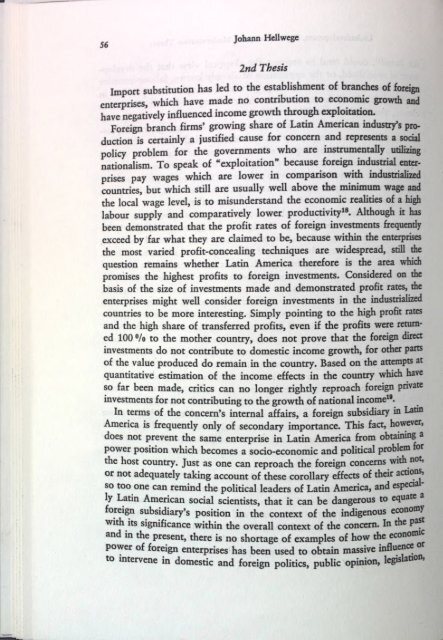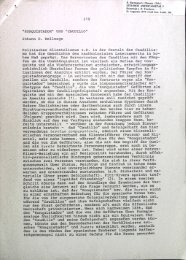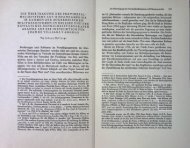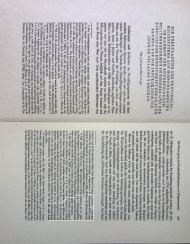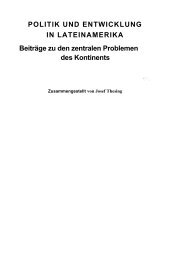9_Law and State_Volume 17
You also want an ePaper? Increase the reach of your titles
YUMPU automatically turns print PDFs into web optimized ePapers that Google loves.
56<br />
Johann Hellwege<br />
2nd Thesis<br />
Import substitution has led to the establishment of branches of foreign<br />
enterprises, which have made no contribution to economic growth <strong>and</strong><br />
have negatively influenced income growth through exploitation.<br />
Foreign branch firms’ growing share of Latin American industry’s production<br />
is certainly a justified cause for concern <strong>and</strong> represents a social<br />
policy problem for the governments who are instrumentally utilizing<br />
nationalism. To speak of “exploitation” because foreign industrial enterprises<br />
pay wages which are lower in comparison with industrialized<br />
countries, but which still are usually well above the minimum wage <strong>and</strong><br />
the local wage level, is to misunderst<strong>and</strong> the economic realities of a high<br />
labour supply <strong>and</strong> comparatively lower productivity18. Although it has<br />
been demonstrated that the profit rates of foreign investments frequendy<br />
exceed by far what they are claimed to be, because within the enterprises<br />
the most varied profit-concealing techniques are widespread, still the<br />
question remains whether Latin America therefore is the area which<br />
promises the highest profits to foreign investments. Considered on the<br />
basis of the size of investments made <strong>and</strong> demonstrated profit rates, the<br />
enterprises might well consider foreign investments in the industrialized<br />
countries to be more interesting. Simply pointing to the high profit rates<br />
<strong>and</strong> the high share of transferred profits, even if the profits were returned<br />
100% to the mother country, does not prove that the foreign direct<br />
investments do not contribute to domestic income growth, for other parts<br />
of the value produced do remain in the country. Based on the attempts at<br />
quantitative estimation of the income effects in the country which have<br />
so far been made, critics can no longer rightly reproach foreign private<br />
investments for not contributing to the growth of national income18.<br />
In terms of the concern’s internal affairs, a foreign subsidiary in Latin<br />
America is frequently only of secondary importance. This fact, however,<br />
does not prevent the same enterprise in Latin America from obtaining a<br />
power position which becomes a socio-economic <strong>and</strong> political problem for<br />
the host country. Just as one can reproach the foreign concerns with not,<br />
or not adequately taking account of these corollary effects of their actions,<br />
so too one can remind the political leaders of Latin America, <strong>and</strong> especi<br />
ly Latin American social scientists, that it can be dangerous to equate a<br />
foreign subsidiary’s position in the context of the indigenous economy<br />
with its significance within the overall context of the concern. In the pas<br />
<strong>and</strong> in the present, there is no shortage of examples of how the econotm<br />
power of foreign enterprises has been used to obtain massive influence 0<br />
to intervene in domestic <strong>and</strong> foreign politics, public opinion, legis anon,


